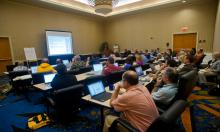Workshop
iDigBio's 2nd Train-the-Trainers Georeferencing Workshop (TTT2)
From across the continent, a diverse group of 26 participants, 10 remote participants, and five instructors gathered in Gainesville from August 12 – 16 for a week-long intermediate to advanced course on georeferencing natural history museum legacy specimen data, emphasizing how to present and teach these skills to others. Please see our TTT2 wiki, TTT2 participant list, TTT2 Course Topics Summary List, Training Videos on Vimeo, and photos on facebook for details.
iDigBio Responds to Call for International Collaboration
The expansive scope of iDigBio’s activities places it in the forefront of national and international digitization and data aggregation efforts. Recognizing the importance of its numerous international partners and encouraged by the NSF to expand international collaborations, iDigBio accepted an invitation to join a digitization symposium featured at the 12th Pacific Science Inter-Congress held at the University of the South Pacific in Suva, Fiji, and to follow the symposium with a digitization workshop for the Commonwealth Scientific and Industrial Research Organisation (CSIRO), in Canberra, Australia.
SPNHC 2013 – DemoCamp: Demonstration of iDigBio’s Specimen Data Portal
Demo Camp live demonstrations are a highlight of the annual SPNHC conferences. This year, iDigBio took this great opportunity to show the natural history collections community all we've accomplished in two years’ time. iDigBio Principal Investigator, Pam Soltis, stepped up to show off the iDigBio Data and Image Portal.
SPNHC 2013 - Special Feature: iDigBio all-day symposium sponsored by iDigBio and the Natural Science Collections Alliance
From June 17-21, seven members of iDigBio (Gil Nelson, Pam Soltis, Joanna McCaffrey, Larry Page, Bruce MacFadden, Kevin Love and Deborah Paul) participated in SPNHC 2013, which is the annual meeting of the Society for the Preservation of Natural History Collections (http://www.spnhc.org/), fondly referred to as “spinach.”
iDigBio Retreat 2013: Incorporating Insights and Ideas for the Future
On May 6th and 7th, 2013, in a barn 3 hours from the home of iDigBio at University of Florida in Gainesville, the entire staff of iDigBio from UF and Florida State University gathered at Tall Timbers Research Station just north of Tallahassee for a two day retreat. Getting together at one time and in one place to work together was a rare opportunity everyone appreciated. We shared stories, celebrated almost two years of our project, and worked on our strategic plan.
iDigBio Announces the Second Train-the-Trainers Georeferencing Workshop (TTT #2)
iDigBio Announces the Second Train-the-Trainers Georeferencing Workshop (TTT #2)
UPDATE: Participants Selected, GWG Second Train the Trainers Workshop Agenda
NOTE: AdobeConnect set up for REMOTE participation. Join us!
Save the Date Now and Join us remotely! See you August 12th - August 16th.
Application submission deadline was Thursday May 9th, 2013.
- Application via Google Form: http://tinyurl.com/gwgttt2app
iDigBio Summit II Report
Summary
The second annual iDigBio Summit was held on October 23-24, 2012, in Gainesville, Florida, and was completed with great success! The Summit promoted clarification of objectives, communication of progress towards achieving objectives, identification and discussion of challenges and opportunities, and collaboration among stakeholders.
1st Annual iDigBio Augumenting OCR Hackathon: Fort Worth, Texas, February 13-14
iDigBio Augmenting OCR Hackathon
February 13-14, 2013, in Fort Worth, Texas
Be a part of helping to get "dark data" out of millions of museum cabinets and into online databases!
UPDATE! See Hackathon Wiki: http://tinyurl.com/aocrhackathonwiki and Participate Remotely!
1st Annual iDigBio Augumenting OCR Hackathon: Fort Worth, Texas, February 13-14
iDigBio Augmenting OCR Hackathon
February 13-14, 2013, in Fort Worth, Texas
Be a part of helping to get "dark data" out of millions of museum cabinets and into online databases!
New iDigBio Workshop Opportunity: Digitizing Specimens in Wet Collections, March 5–6, 2013
iDigBio is pleased to announce the second in a series of preparation-specific workshops focusing on organizing, launching, maintaining, and enhancing a biological collections digitization program. This new workshop will focus on digitization of wet collections, to include specimen label databasing, specimen imaging, ledger and field book imaging, and digitization of legacy objects such as X-rays, CT scans, and 35mm slides.





